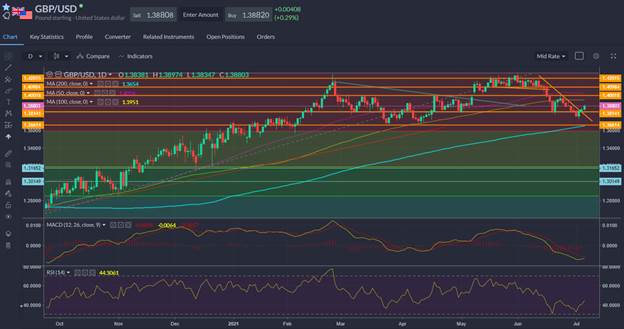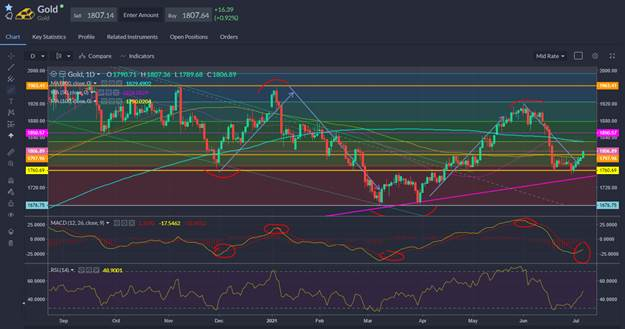Oil advanced to its highest since Nov 2014 as OPEC+ abandoned its July meeting, after the United Arab Emirates stood its ground over production increases. The failure to agree to increasing production in August and beyond leaves the market even more in deficit than before, so front month WTI spiked to a near 7-year peak this morning close to $77. Saudi Arabia and Russia had agreed to increase production by 400k bpd monthly from August to December, adding an additional 2m bpd from current levels of supply by the year end. However the UAE wanted to recalculate the baseline for its production quota as it has significantly increased capacity in the last 2-3 years. This is an interesting moment for the path of oil prices – does the breakdown signal a push to $100 is on, or will it lead to more uncertainty and more oil on the market longer term? The short-term effect is less oil on the market (bullish), but it exposes the OPEC+ production deal to a risk of breaking down, which could see producers pumping much more (bearish). There is a risk that compliance with current production quotas will lessen, whilst the UAE could yet threaten to leave OPEC and pump what it chooses. Sec Gen Barkindo said a new meeting would be called in due course.
Stock markets in Europe edged a tad lower this morning after finishing higher on Monday despite a weak start to the session. Indices continue to tread well-worn ranges. US futures are steady as Wall Street returns to life following the long weekend. The FTSE 250 hit a new record high in early trade as England heads towards the lifting of all Covid restrictions on July 19th. Clearly reopening is good for domestic growth, so it’s been seen as a positive for UK-focused stocks.
Shares in Chinese ride hailing app Didi (NYSE:DIDI) slumped as much as 28% in pre-mkt trading after the app was removed from the country’s app stores. It’s a complicated picture – there are reports Didi knew of a regulatory crackdown and was even asked to delay its IPO. Didi says it had no knowledge of the actions by the cybersecurity regulator. The stock only started trading on Wednesday and the ban announced on Sunday. China is cracking down on big tech, but the decision to remove the app from domestic platforms appears to be timed for maximum impact and embarrassment. China’s Communist Party is bristling at the number of Chinese companies listing in the US this year, but there is a genuine concern at the heart of this - regulators are not impressed at the way Didi and other Chinese tech companies handle data. The SEC will not be impressed either way.
Sainsbury's (LON:SBRY) reports like-for-like sales rose 1.6% in Q1, with sales across the board higher than expected in the quarter as it benefitted from continued pandemic-related restrictions. On a two-year basis, total retail sales are up more than 10%. Management raised the profit outlook for the year to £660m against £630m anticipated. Sainsbury’s says it will use some additional profit to invest in the customer offer - yesterday it announced £50m on targeted price reductions on ‘everyday essentials’. Supermarkets have done well out of the pandemic, but it’s unclear the extent to which reopening will negatively impact sales against some very tough comparisons. Inflation is also risk in this ultra-competitive sector. If you’re a shareholder, the last thing you want is a supermarket price war right now.
It’s been a tough year for Ocado (LON:OCDO) shareholders as the reopening trade went against them, leaving the stock down ~14% YTD. But shares are up 2% this morning after another solid half-year report. Group revenues rose 21.4% to £1.3bn, with its retail business growing to £1.2bn, up 19.8%. The waiting game continues abroad: International Solutions revenues of £26.6m but management affirmed that Ocado Smart Platform (OSP) fees are building as expected. Group EBITDA more than tripled to £61m, but still the group reported a loss before tax of £23.6m, though this was down from £40m last year. Meanwhile Morrisons is steady at 266p as investors bank on another offer or two before this bidding war ceases.
Australia’s central bank said it will begin tapering asset purchases to maintain the target on the country’s three-year yield. The Reserve Bank of Australia will pare weekly bong buying from A$5bn to A$4bn as it continues to target a yield of 0.1% on its three-year paper, while leaving the benchmark interest rate unchanged at 0.1%. Overall, the message was a little more hawkish than expected, with the tapering and change in language around the forward guidance. AUDUSD advanced to its highest in a week, with 0.76 offering near-term resistance.
Elsewhere, the dollar fell as the European session got underway. GBPUSD continues to break out of the downtrend.

Gold is firmer with a bullish MACD crossover confirmed on the daily chart and push clear of $1,800 now possible.

